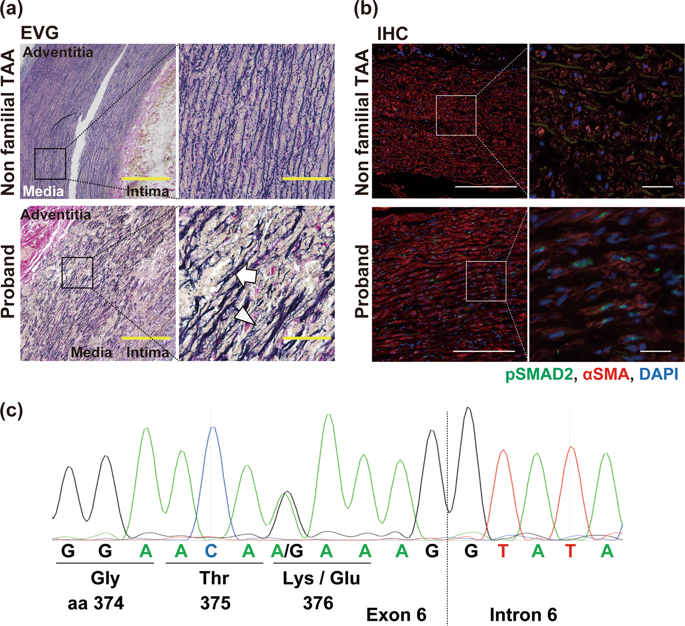当前位置:
X-MOL 学术
›
Hum. Genome Var.
›
论文详情
Our official English website, www.x-mol.net, welcomes your
feedback! (Note: you will need to create a separate account there.)
Activation of TGF-β signaling in an aortic aneurysm in a patient with Loeys-Dietz syndrome caused by a novel loss-of-function variant of TGFBR1.
Human Genome Variation ( IF 1.0 ) Pub Date : 2019-01-18 , DOI: 10.1038/s41439-019-0038-x Hironori Hara 1 , Norifumi Takeda 1 , Takayuki Fujiwara 1 , Hiroki Yagi 1 , Sonoko Maemura 1 , Tsubasa Kanaya 1 , Kan Nawata 2 , Hiroyuki Morita 1 , Issei Komuro 1
Human Genome Variation ( IF 1.0 ) Pub Date : 2019-01-18 , DOI: 10.1038/s41439-019-0038-x Hironori Hara 1 , Norifumi Takeda 1 , Takayuki Fujiwara 1 , Hiroki Yagi 1 , Sonoko Maemura 1 , Tsubasa Kanaya 1 , Kan Nawata 2 , Hiroyuki Morita 1 , Issei Komuro 1
Affiliation

|
Loeys-Dietz syndrome (LDS) is caused by variants of transforming growth factor-β (TGF-β)-related genes and is characterized by aortic aneurysm and dissection. We report an LDS patient with a de novo missense variant of TGFBR1 [c.1126A>G, p.(Lys376Glu)] in which active TGF-β signaling was observed in the aorta, despite the in vitro demonstration that the loss-of-function mutation lies within the serine/threonine kinase domain. The mechanism underlying this TGF-β paradox in LDS aortopathy should be further investigated.
中文翻译:

Loeys-Dietz综合征患者的主动脉瘤中TGF-β信号转导的激活是由新型TGFBR1功能丧失引起的。
Loeys-Dietz综合征(LDS)是由转化生长因子-β(TGF-β)相关基因的变异引起的,其特征是主动脉瘤和解剖。我们报道了一位患有TGFBR1的从头错义变异的LDS患者[c.1126A> G,p。(Lys376Glu)],尽管体外实验表明,主动脉中存在活跃的TGF-β信号传导,功能突变位于丝氨酸/苏氨酸激酶域内。这种TGF-β悖论在LDS主动脉病变中的潜在机制应进一步研究。
更新日期:2019-11-18
中文翻译:

Loeys-Dietz综合征患者的主动脉瘤中TGF-β信号转导的激活是由新型TGFBR1功能丧失引起的。
Loeys-Dietz综合征(LDS)是由转化生长因子-β(TGF-β)相关基因的变异引起的,其特征是主动脉瘤和解剖。我们报道了一位患有TGFBR1的从头错义变异的LDS患者[c.1126A> G,p。(Lys376Glu)],尽管体外实验表明,主动脉中存在活跃的TGF-β信号传导,功能突变位于丝氨酸/苏氨酸激酶域内。这种TGF-β悖论在LDS主动脉病变中的潜在机制应进一步研究。











































 京公网安备 11010802027423号
京公网安备 11010802027423号